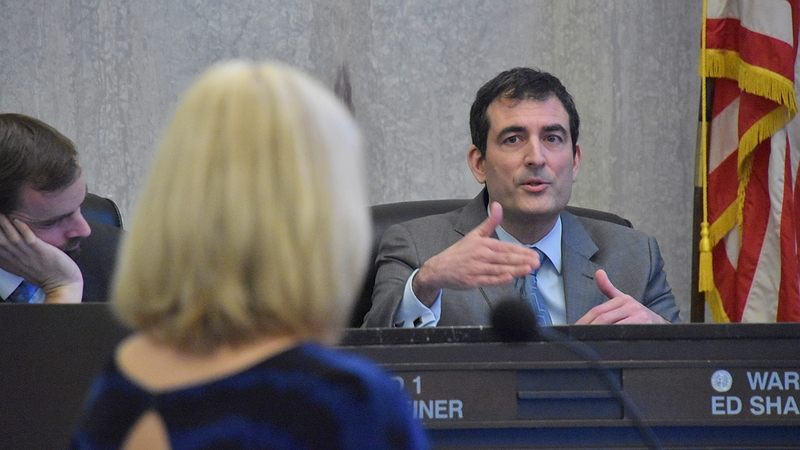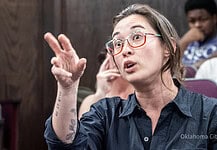Last Updated on July 26, 2018, 12:21 PM | Published: July 25, 2018
The attorney for Oklahoma City Ward 2 Councilman Ed Shadid is drafting a lawsuit against the City of Oklahoma City over possible violations of the Oklahoma Open Meeting Act.
Shadid is ratcheting up his long-standing criticism of City Manager Jim Couch and others over the practice of dividing the Council into smaller groups out of public view to skirt Oklahoma Open Meeting Act rules.
The council member believes the practice is used to avoid public input on millions of taxpayer dollars given by the city as incentives for economic development.
Cameron Spradling, Shadid’s attorney, told Free Press that Shadid will make a statement to the Council at the next meeting Tuesday, July 31 about the matter.
Spradling believes that after the Council meeting they will formally file a lawsuit under the Open Meetings Act challenging the city’s practices.
Shadid’s complaint
Shadid summed up his concern and a possible legal challenge in a statement prepared and released after the Council meeting by his attorney Tuesday, July 17.
Shadid was out of the country fullfilling a long-planned commitment and so was not present for the meeting.
The Council had just voted unanimously (in Shadid’s absence) for several heavy economic development proposals.
“What I want the public to understand more than anything is that the use of ‘serial meetings’ is systemically being utilized throughout multiple government bodies to minimize public engagement and deliberation and the loophole must be closed by the judiciary immediately.”
He claims that under Couch’s leadership, the eight-person City Council is dividing up into smaller groups of less than the majority to avoid triggering Open Meeting Act rules.
Then, Couch and others shuttle between the groups to communicate what the others have said.
The practice, called “serial meeting” or “shuttle diplomacy,” has been tried in various ways since the law took effect in 1977.
Council knowledge
“Couch works on these deals and then, talks to us for 15 minutes,” Shadid told Free Press in a phone interview Tuesday.
“The council doesn’t know enough about what’s going on. They never really challenge these proposals.”
“The problem is the council doesn’t know what is on the cutting room floor. The council doesn’t know what deal got rejected. They only see Couch’s presentation of the final deal.”
Last to know
It also means that the tax-paying public is the last to know about any of the proposals once the council members have already come to a consensus in the smaller groups.
The topic for this type of deliberation is usually economic development where the city negotiates deals with companies that involve millions in tax-payer-funded incentives for economic growth.
The effect is that when the public vote is taken later, there is little revealed about how the body came to that vote in the first place and public input matters little when the final decision is made to hand out incentives.
Shadid says that over the seven years he has been on the Council he has witnessed this practice “several times” each year.
City’s opinion
The Oklahoma City Municipal Counselor’s view is that the law says a “meeting” that is subject to the Open Meetings Act is one where a “majority” of the members of the body are present.
But concerns about gaming the act by the use of small groups and serial phone calls have persisted over the years since the law’s passing resulting in several Oklahoma Attorney General opinions and Oklahoma Supreme Court decisions that seem to challenge the view of the OKC Municipal Counselor’s office.
Critics of the narrow reading of the law taken by the Oklahoma City Municipal Counselor’s office say that the practice is violating the larger purpose of the law, which is to make government transparent to the governed in Oklahoma.
Others weigh in
“You can’t have that situation where a group of council members meets with the same staff member who then goes to the next meeting and tells them how the other group is going to vote,” Joey Senat told Free Press.
Senat is a Journalism Professor at Oklahoma State University and an authority on the application of Oklahoma’s open government laws.
“And then to have a person go back and forth between the two groups to choose your consensus is a blatant violation,” Senat said.
“Why are they doing it? Good government would dictate that you would have those discussions in public.”
“You’re doing it this way because you don’t want the public to know what the council is doing. You’re trying to keep the public in the dark.”
Founder, publisher, and editor of Oklahoma City Free Press. Brett continues to contribute reports and photography to this site as he runs the business.










